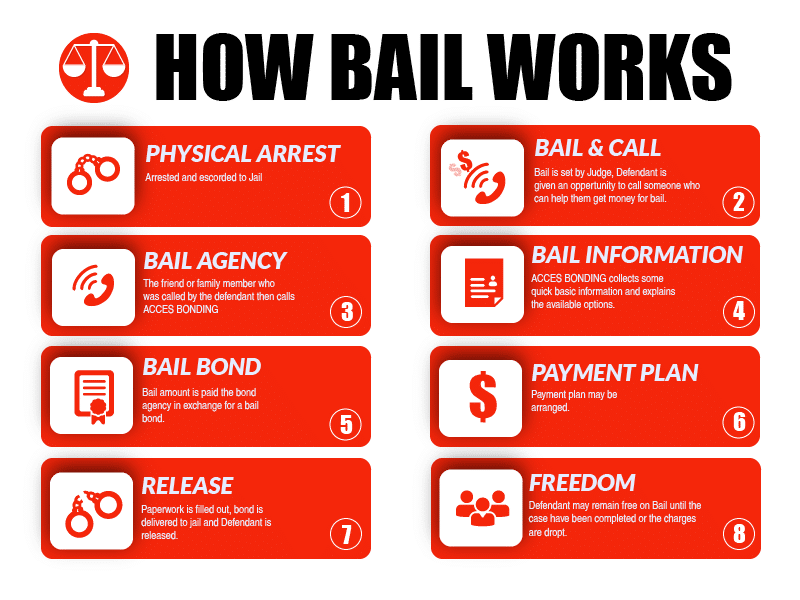Relied On Bail Bonds Dayton Ohio - Quick and Reliable Service
Relied On Bail Bonds Dayton Ohio - Quick and Reliable Service
Blog Article
Browsing the Lawful Labyrinth: Bail Bonds Explained for Beginners
Browsing the complexities of the legal system can frequently really feel like passing through a daunting labyrinth, particularly when it comes to understanding Bail bonds. For novices entering this unfamiliar terrain, understanding the intricacies of Bail bonds is vital in ensuring a informed and smooth process. From the fundamentals of how Bail bonds work to the different types available, each element plays an essential role in promoting the release of individuals awaiting trial. As we delve deeper right into this topic, clearness will be lost on the bail bond process, the connected costs, and important pointers for efficiently engaging with Bail bondsmen.
Essentials of Bail Bonds
Comprehending the essential principles of Bail bonds is essential for browsing the lawful procedure effectively and responsibly. Bail bonds offer as an economic warranty that an accused will show up in court as needed. When an individual is jailed, they might be given the opportunity to post Bail in order to safeguard their release up until their court day. If the individual can not afford the complete Bail quantity established by the court, a bail bond representative can be gotten to supply the needed funds on their behalf.
Essentially, a bail bond is a contract between the accused, the court, and the bail bond representative. The representative concurs to pay the complete Bail amount if the defendant stops working to appear in court, in exchange for a non-refundable charge typically established at 10% of the total Bail.
Types of Bail Bonds
The most common kind is a money bond, where the offender or a family member pays the complete Bail amount in cash money. One more alternative is a surety bond, where a bond bondsman pays the Bail on behalf of the accused for a cost, typically around 10% of the complete Bail amount. Recognizing these different kinds of Bail bonds can help people browse the legal process a lot more efficiently.
Bail Bond Refine Explained
If the offender can not pay for the full Bail amount, they can seek the services of a bail bondsman. The offender or their liked ones pay the bail bondsman a non-refundable charge, normally a percentage of the overall Bail amount, to protect a bail bond.

Understanding Bail Bond Costs
Upon protecting a bail bond bonding process via a bondsman, people come across an essential element of the lawful procedure: the monetary responsibilities tied to the bail bond. Bail bond expenses usually entail a non-refundable fee, normally around 10% of the complete Bail amount established by the court. For instance, if the court sets Bail at $10,000, the bail bond premium will be $1,000. If the defendant falls short to appear in court., this cost is the bondsman's cost for uploading the complete Bail amount and assuming the danger.
Along with the costs, security might be needed to safeguard the bail bond. Security can be in the kind of residential or commercial property, beneficial properties, or a co-signer who guarantees settlement if the accused skips Bail. The security acts as a back-up prepare for the bail bondsman in case the accused absconds.
It's important for individuals looking for Bail bonds to fully understand the costs included and the regards to the arrangement before proceeding. By being informed regarding bail bond expenses, people can browse the legal process better and make educated decisions.
Tips for Collaborating With Bail Bondsmen

Additionally, it's important to provide exact info regarding the accused and their situation. This includes details such as their full name, date of birth, the place of their apprehension, and the costs they are encountering. dayton bail bonds. Providing insufficient or wrong information can cause hold-ups in the bail bond procedure

Verdict
In conclusion, understanding the essentials of Bail bonds, the various kinds readily available, the process entailed, and the costs related to them is important for navigating the lawful system. By working with Bail bondsmen and adhering to these ideas, individuals can make sure a smoother and extra reliable Bail procedure. It is critical to be informed and experienced when taking care of Bail bonds to prevent any kind of unnecessary difficulties or misconceptions.
Essentially, a bail bond is an agreement between the defendant, the court, and the bail bond representative. An additional option is a guaranty bond, where a bail bondsman pays the Bail on part of the accused for a fee, normally around 10% of the overall Bail amount. The offender or their liked ones pay the bail bondsman a non-refundable fee, generally a percent of the overall Bail quantity, to protect a bail bond.Upon securing a bail bond through a bondsman, individuals come across a vital aspect of the legal process: the economic commitments tied to the bail bond. Bail bond expenses usually include a non-refundable charge, generally around 10% of the complete Bail amount set by the court.
Report this page